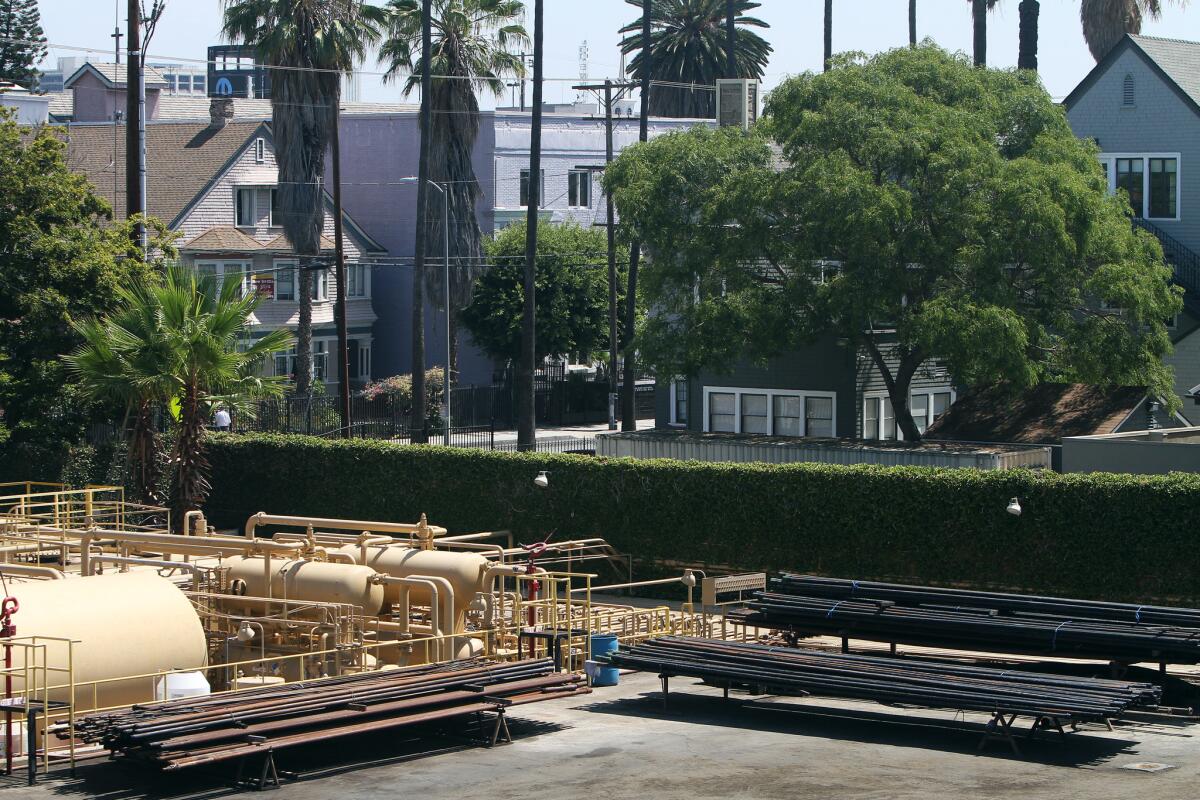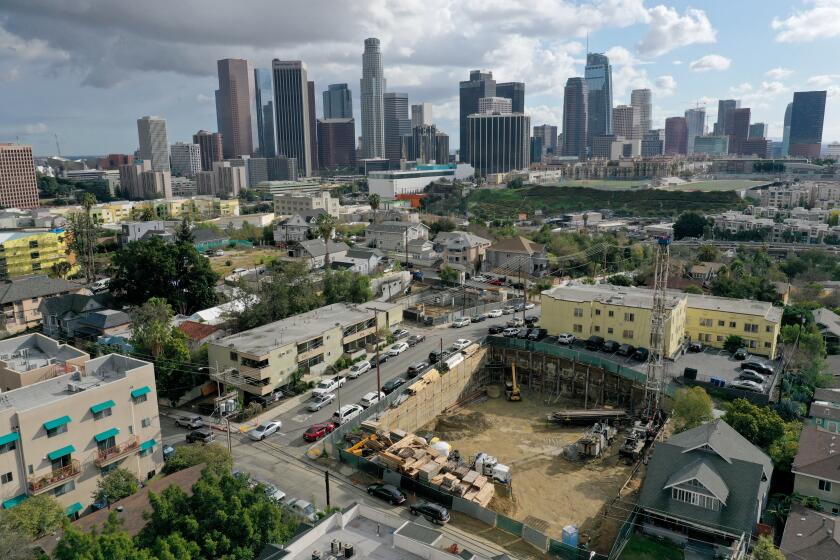State orders permanent shutdown of oil drilling site near USC

California regulators are ordering Allenco Energy to plug wells and decommission an oil drilling site whose neighbors once complained of nosebleeds, headaches and other ailments, permanently closing the South Los Angeles facility.
In the order, State Oil and Gas Supervisor Uduak-Joe Ntuk declared that Allenco Energy had “deserted” the facility and failed to properly fix leaks that showed that wells were deteriorating.
Last month, one of the company’s executives told state regulators that it would no longer be spending “further capital” on the South L.A. site. Ntuk said in his order that the company must decommission the facility in accordance with state law.
The decision marks the latest turn in a lengthy saga over the site near USC, which became the focus of a flurry of neighborhood protests and government investigations. Allenco Energy agreed to suspend operations there more than six years ago, after complaints about headaches and other ailments suffered by neighbors.
Order to Plug and Abandon Wells
By that time, federal and local investigations had been launched and an environmental team touring the site had been sickened by toxic fumes. Sen. Barbara Boxer called on the company to suspend operations.
Los Angeles City Atty. Mike Feuer then sued and obtained a court order requiring Allenco Energy to follow new requirements if it wanted to restart operations. Environmental and neighborhood activists argued it should never be allowed to do so.
Hundreds of unplugged oil wells puncture the urban landscape of Los Angeles. But the city has been reluctant to use its full powers to ensure cleanup and protect the public.
The latest move by the California Geologic Energy Management Division, formerly known as the Division of Oil, Gas, and Geothermal Resources, heartened community activists who had called for the site to be permanently closed.
“This has been a long time coming and we’re extremely grateful” to the state agency, said Nancy Halpern Ibrahim, executive director of the nonprofit Esperanza Community Housing, which raised concerns about health effects from the well site.
Ibrahim credited Ntuk, who previously served as petroleum administrator for the city of Los Angeles, for being “very, very familiar with how devastating the emissions from Allenco have been for our community — and he has acted consistent with his understanding and scientific expertise.”
An Allenco Energy representative declined to comment on the state order. Last month, company Vice President Timothy Parker told state regulators that it was in the process of liquidating and planned to sell its portion of the South Los Angeles site.
Letter from Allenco Energy Vice President
In his letter, Parker wrote that it had become apparent to the company that the city and state regulators did not want Allenco Energy to operate any of the wells there, “even though it was our fair and legal right to do so.”
Parker complained that the state had changed its rules and made it too hard to reopen the site. “It is with great sadness that we’re not able to continue to afford all of the expenses connected to” the site, Parker write. “We have spent tremendous amounts of capital trying to be compliant and prove that we are good stewards of compliance!”
Allenco Energy is currently in talks with the Archdiocese of Los Angeles, which owns the property, and a possible developer to “remove us from having any further business responsibilities at this site,” Parker added.
Ntuk cited a string of recent violations issued in October, November and December in his order, stating that gas leaks “pose a safety hazard” and “multiple gas leaks at multiple locations suggest deteriorating equipment.”
Allenco Energy “has generally attempted to undertake repairs to address minor leaks within a reasonable amount of time,” Ntuk noted. “However, some of these leaks reappeared on the same equipment after the initial repair indicating that the initial repair was inadequate.”
Decommissioning the facility will require the proper plugging and abandonment of all wells; drainage and removal of pipes, tanks and vessels; demolition of all buildings and structures; removing and disposing of contaminated soils; and restoring the surface to “native or near native conditions,” according to California Department of Conservation spokesman Donald Drysdale.
A recent investigation by The Times and the Center for Public Integrity found that the city of Los Angeles has been slow and inconsistent in forcing the petroleum industry to take responsibility for wells that sit idle and unplugged, even though it has some regulatory powers that are stronger than those of the state. Critics say it failed to fully exercise its powers at the Allenco Energy site.
City Councilman Gil Cedillo, who represents the area around the facility, recently introduced a proposal asking for city agencies to meet with the Archdiocese about possible uses for the site. In a statement Friday, the councilman said he was pleased that the California state agency had ordered the closure of the site, saying it was “about time.”
“Just this week I introduced a motion to begin discussions on the prospects of partnership for positive use of this land. Now, with the permanent termination of oil production at the facility, the neighborhood can officially begin the long road to environmental recovery,” Cedillo said. “No community should have to compromise their health for any reason in the city of Los Angeles.”
Times staff writer Ryan Menezes contributed to this report.
More to Read
Sign up for Essential California
The most important California stories and recommendations in your inbox every morning.
You may occasionally receive promotional content from the Los Angeles Times.












